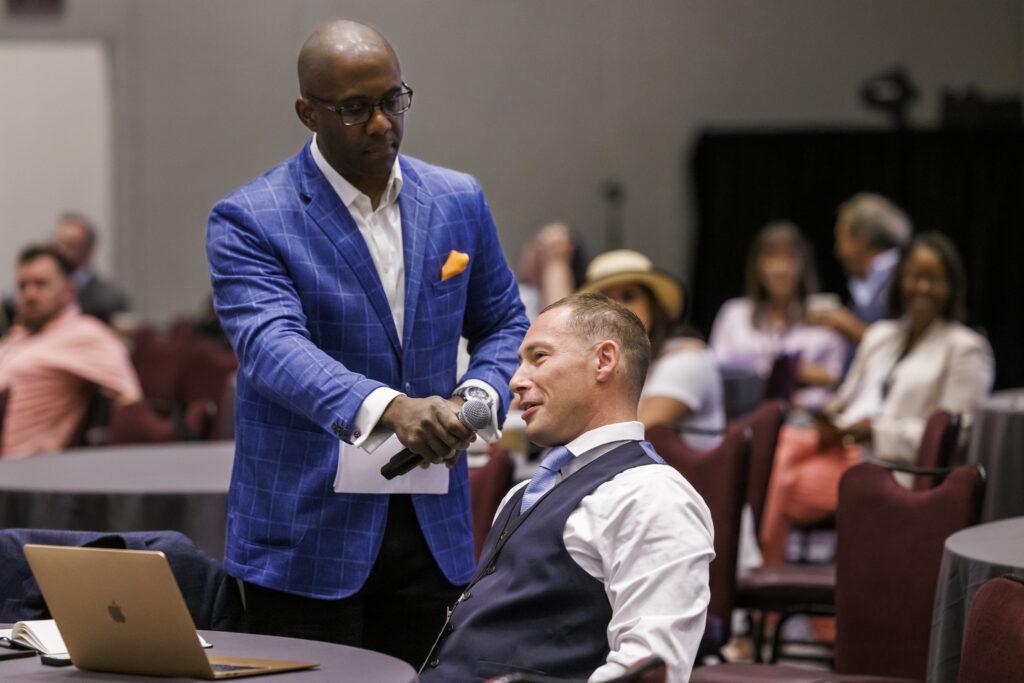Outline: Preference vs. Binary | Building a System That Helps You Get Where You Want | The Answer To Distinguishing Preference vs. Binary | Final Thoughts
Although some of us are born as we are and don’t veer from our authentic selves for even a second, some of us become entrenched in what society wants us to be, how our parents want us to live, or what our bosses think our talent is worth.
We’ve all seen statistics detailing how creativity diminishes as kids get older. That’s because they learn to conform. Schools teach us “the right way,” but most things in life come down to preference.
It wasn’t until I stopped trying to play other people’s games shaped by their preferences that I unlocked my true potential. And you can, too.
Preference vs. Binary: Is a Right or Wrong Answer or Not?
What would you say if I asked you if I should buy a house to renovate, launch a marketing campaign for my business, or work with my spouse? How would you advise me? Would you give me a “right” or “wrong” answer?
If I asked five different people, I’d most likely get five different answers. I’d then be left with even more uncertainty because I didn’t know the right answer. So, what is the right answer? It depends.

The real question is: What do I want? Or put another way: What am I trying to get closer to?
Answering this question requires knowing what I want before I ask the question in the first place.
When it comes to business or finance, many people adopt a right-or-wrong mentality—or a binary. And there are plenty of voices on the internet that encourage this type of thinking.
Let’s begin with when we’re young. As we go through school, we lose our creativity. We begin to conform and buy into narratives that we need to be creative geniuses to succeed. In education, there are standards. If you exceed those standards, you’re considered smart.
A narrative exists that there is a right and wrong in every domain and subdomain. Yet, we could ask ten people questions like, “Should I buy a house, or should I hire employees?” and get ten different explanations. That’s because we must understand that almost every question is actually preference-based. In other words, there’s no right or wrong. It depends on what you want.
Play Your Game: Build a System That Gets You Closer to What You Want
When you don’t understand that a question you’re asking is a preference, then you create more uncertainty. You’re running the risk of getting an answer you take as fact, thus, driving you further away from what you want.
In my experience—and from years of working with clients—this is what I’ve observed: We could take two business owners in the same industry with the same revenue, size, and number of partners, and they could still want totally different things. One business owner could wish to double their current business size. The other might say, “I don’t care about growing my business anymore. I just want more time.”
They’re in the same business with the same revenue but want different things. And they are both correct. The point is that the business decisions we’re facing are preference-based. That means you must get clear on what you want.
When I raise the idea of “what you want” with clients, a common response is: well, what is a good “want?” There is no “good” or “bad” want (okay, you could come up with something morally or ethically wrong). There wouldn’t be preferences if there were a “good” or “bad” want. Everything would be binary. But fortunately, everything is not binary.
The Answer To Distinguishing Preference vs. Binary
The next natural question is, “how do I distinguish between preference and binary?”
That’s when we turn to WWGD: What Would Google Do? Can the question you’re asking yourself be solved with a Google search?
In your day-to-day, questions might look something like this:
● “Should I scale my business?”
● “Should I hire a nanny first or an executive admin?”
● “Should I buy a house or rent?”
● “Should I invest in this marketing campaign?”
● “Should I hire employees or contractors?”
● “Should I raise my prices?”
● “Should I launch this new product?”
● “Should I offshore part or all of my team?”
● “Should I turn this home into a rental property?”
● “Should I renovate my home or sell it and buy a new home?”
And here’s the nefarious answer to each of the above: It depends. These answers are not binary. Google may return millions of hits to each of those questions. Still, as you read through the search results, you’ll find a caveat or an underlying anxiety stopping you from implementing the recommendations.
Inherently, you know there is no universal truth or false to the questions you’re asking. I’d argue that’s one of the joys of business and life. It’s also where dynamic complexity exists.

See, not only do the answers to questions like these vary, but they also depend on your specific preferences. You need to ask yourself: What are you prioritizing?
The correct answer for one person may differ from the right answer for another person in the same position. In the case of the nanny versus admin question, if spending more time with your kids is your priority, then the admin would be the best move. If not, the reverse may get you closer to what you really want.
Final Thoughts
The idea of Preference vs. Binary is something I talk about more in my book, “Rigging the Game.” I view it as a commandment and warning against overgeneralized black-and-white answers. When we subscribe to what we believe to be universal, cookie-cutter answers to our questions, everyone gets stuck doing what they “should” do – and no one ever really gets what they want.
About the Author

Dan Nicholson is the author of Rigging the Game: How to Achieve Financial Certainty, Navigate Risk and Make Money on Your Own Terms, deemed a best-seller by USA Today and The Wall Street Journal, among others. In addition to founding the award-winning accounting firm Nth Degree CPAs, Dan has created and run multiple small businesses, including Certified Certainty Advisor, a professional certification he runs through CertaintyU. Dan also developed the Certainty App, a financial tool built for entrepreneurs based on the ideologies he teaches. Dan also hosts the Rigging the Game podcast, a resource for entrepreneurs who want unconventional tips to win at business, and is a Consulting Producer for PBS’ Opportunity Knocks. You can learn more about Dan at https://www.riggingthegame.com/.







